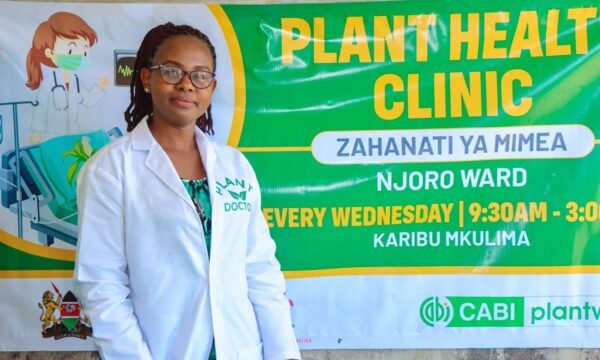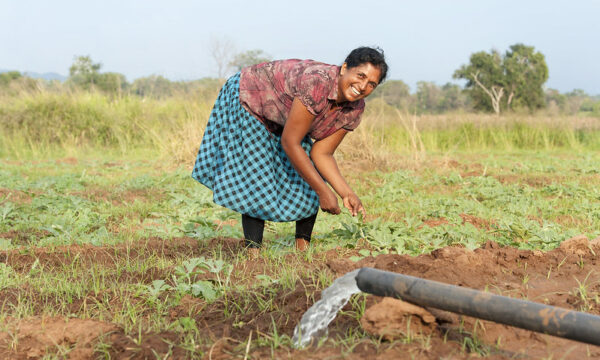
Pests, which threaten to destroy key cash and food security crops including maize, tomato and beans, are to be prioritized as part of an integrated pest management strategy using state-of-the-art space-age technology.
Scores of smallholder farmers in Rwanda are the latest to benefit from the CABI-led consortium, funded by the UK Space Agency and the Global Challenges Research Fund with co-funding from the CABI-led Plantwise, that is using a combination of earth observation technology, satellite positioning and plant-pest lifecycle modelling to provide an evidence-based Pest Risk Information Service (PRISE).
Crop pests account for estimated yield losses of around 40 percent – not only affecting the livelihoods of farmers and their families but also local, regional and national food security.
PRISE is working to forecast the risk of pest outbreaks and, through Plantwise plant clinics, allows local plant health extension officers to provide farmers with advice on how to protect their crops from a range of pests and diseases such as the Fall armyworm, tuta absoluta and African bollworm.
The Rwanda Agricultural Board (RAB) of the Ministry of Agriculture is working with a range of CABI teams and other members of the consortium including Assimila, Kings College Londonand the Centre for Environmental Data Analysis to give timely alerts and advice to farmers, either through the Plantwise plant clinics or via other intermediaries, so they can respond more efficiently to the risks posed to their crops.
Charlotte Day, CABI’s Project Manager for PRISE, said, “Crop pests unfortunately don’t respect geographical boundaries and their movements, exacerbated by climate change, are becoming ever more unpredictable.
“This is forcing us to find innovative new ways to predict their movements and manage their impacts which not only include compromising food security but also the weakening of supply chains and international trade.”
Charlotte added that PRISE works by collecting and combining disparate datasets from the field which are then fed into a computer model. It is hoped that observations from farmers themselves will also add to the data and help strengthen and validate the system.
As well as operating in Rwanda, PRISE is also working to help farmers in Malawi, Ghana, Kenya and Zambia.
Additional information
Donors
UK Space Agency with co-financing from Plantwise.
Partners
- Assimila – Project consortium
- King’s College London – Project consortium
- Centre for Environmental Data Analysis – Project consortium
- Ministry of Agriculture, Irrigation and Water Development (MOAIWD), Malawi – International partner
- Plant Protection & Regulatory Services Directorate (PPRSD), Ghana – International partner
- Kenya Agricultural & Livestock Research Organization (KALRO), Kenya – International partner
- Ministry of Agriculture, Livestock and Fisheries, Kenya – International partner
- Zambia Agriculture Research Institute (ZARI), Zambia – International partner
PRISE is funded by the International Partnership Programme (IPP) which is run by the UK Space Agency. IPP focuses strongly on using the UK space sector’s research and innovation strengths to deliver a sustainable economic or societal benefit to emerging and developing economies around the world.
For more details on PRISE please visit the project page on the CABI website.
1 Comment
Leave a Reply
Related News & Blogs
How plant clinics are strengthening crop health services in Bangladesh
When the first-ever plant clinic in Bangladesh opened in Dhaka in 2013, it initially faced a lack of interest due to its novelty and limited awareness among farmers. However, it went on to expand, providing advice to over 17,000 farmers and led to the…
2 July 2025





[…] Crop-devastating pests in Rwanda to be targeted with space-age technology from PRISE programme […]